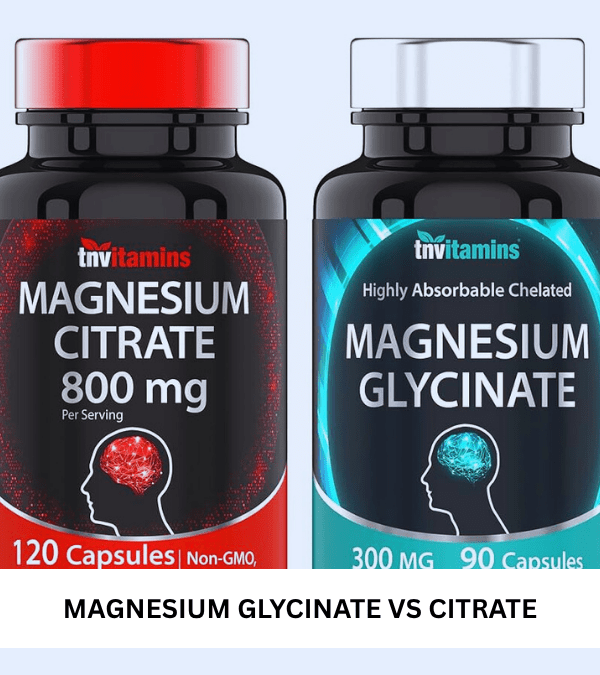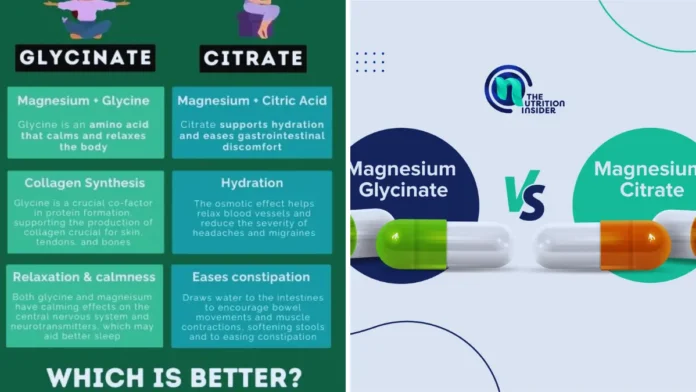When choosing a magnesium supplement, many people find themselves comparing magnesium glycinate vs citrate. Both are popular forms of magnesium, widely praised for their absorption and benefits, yet they differ in how they affect the body. Magnesium is essential for over 300 enzymatic reactions — supporting energy, muscle function, mood regulation, and sleep quality. But the form you choose can significantly influence how well your body absorbs it and what effects you’ll experience.
In this guide, we’ll explore the science-backed differences between Magnesium Glycinate vs Citrate and magnesium, uncover which one suits your specific needs, and share expert insights on dosage, benefits, and side effects. By the end, you’ll know exactly which magnesium supplement best supports your health and lifestyle.
Why Magnesium Matters for the Body
Magnesium is one of the most important minerals for maintaining optimal health. It plays a vital role in muscle contraction, nerve transmission, bone strength, and cardiovascular health. Despite its importance, studies show that up to 60% of adults in the UK may not get enough magnesium from their diet due to processed foods, poor soil quality, and stress.
Common symptoms of magnesium deficiency include:
- Fatigue and low energy
- Muscle cramps or twitching
- Trouble sleeping
- Mood swings or anxiety
- Headaches or migraines
Supplementation can help restore magnesium balance, but the type of magnesium you take determines how effective it will be.
What Is Magnesium Glycinate?
Magnesium glycinate (also known as magnesium bisglycinate) is a chelated form, meaning magnesium is bound to the amino acid glycine. This bonding enhances absorption and reduces the risk of gastrointestinal side effects. Glycine itself is known for promoting relaxation and supporting neurotransmitter function, making this form particularly beneficial for people with stress, anxiety, or sleep disturbances.
Key benefits of magnesium glycinate:
- Highly bioavailable (easily absorbed)
- Gentle on the stomach
- Supports relaxation and better sleep
- Helps manage anxiety and stress
- May improve muscle recovery
Because it’s less likely to cause laxative effects, magnesium glycinate is often recommended for long-term use and for those with sensitive digestion.
What Is Magnesium Citrate?
Magnesium citrate combines magnesium with citric acid. It’s one of the most common and affordable magnesium supplements on the market. Known for its mild laxative effect, it’s frequently used to relieve constipation and promote digestive health.
Key benefits of magnesium citrate:
- High absorption rate
- Supports regular bowel movements
- Helps with muscle function
- May reduce tension headaches and cramps
- Affordable and widely available
However, some individuals find it can cause mild stomach upset or diarrhoea, especially when taken in higher doses.
Magnesium Glycinate vs Citrate: Key Differences at a Glance
| Feature | Magnesium Glycinate | Magnesium Citrate |
| Absorption | Excellent, highly bioavailable | Good, but slightly lower than glycinate |
| Digestive tolerance | Very gentle, minimal side effects | May cause loose stools in some people |
| Main benefits | Stress relief, sleep support, muscle recovery | Digestive aid, constipation relief |
| Best for | Anxiety, insomnia, chronic stress | Occasional constipation, active individuals |
| Taste | Neutral | Slightly sour |
| Form availability | Capsules, powders | Powders, tablets, liquids |
Absorption and Bioavailability
Bioavailability refers to how efficiently your body absorbs and utilises a nutrient. When comparing magnesium glycinate vs citrate, glycinate tends to be absorbed more steadily, making it ideal for individuals who need to restore magnesium levels without digestive discomfort.
In contrast, magnesium citrate dissolves easily in water, meaning it’s absorbed quickly — but this can lead to an osmotic effect in the intestines, pulling water into the colon and potentially causing diarrhoea if taken in large doses.
In summary:
- Glycinate = best for consistent, gentle absorption
- Citrate = best for rapid absorption and digestive aid
Health Benefits Compared

1. Sleep and Relaxation
Magnesium Glycinate vs Citrate shines in this area. Glycine acts as a calming neurotransmitter that enhances sleep quality and reduces anxiety. Many people use it before bed to help unwind and improve deep sleep stages.
Magnesium citrate, while beneficial for muscle relaxation, doesn’t have the same calming effect as glycinate. It’s better suited for daytime use.
2. Digestive Health
Here, magnesium citrate takes the lead. Its natural osmotic properties make it effective for relieving constipation and promoting bowel regularity. Glycinate, by contrast, is too gentle to have this effect — ideal if you want to avoid laxative side effects.
3. Muscle Function and Recovery
Both forms support healthy muscle contraction and prevent cramps, but glycinate is often preferred for athletes due to its steady absorption and reduced gastrointestinal stress.
4. Stress and Anxiety
Glycinate’s amino acid component supports the production of GABA, a neurotransmitter responsible for relaxation and calmness. If you struggle with chronic stress or mood swings, glycinate is your best choice.
5. Heart Health
Both forms contribute to cardiovascular function, helping regulate heartbeat and blood pressure. However, Magnesium Glycinate vs Citrate smoother absorption pattern may make it more effective for long-term heart support.
Which Form Should You Choose?
Your choice depends on your health goals and body’s tolerance.
Choose magnesium glycinate if you:
- Struggle with sleep, anxiety, or stress
- Have a sensitive stomach
- Want consistent absorption without laxative effects
- Need to support muscle recovery and relaxation
Choose magnesium citrate if you:
- Suffer from constipation
- Need a cost-effective magnesium source
- Want a supplement that supports quick absorption
- Prefer a powder that mixes easily in water
Dosage and How to Take Magnesium Safely
The recommended daily amount of magnesium for adults is:
- Men: 300–400 mg per day
- Women: 270–320 mg per day
However, the ideal dosage depends on your diet, health condition, and supplement type.
Tips for optimal use:
- Take magnesium glycinate in the evening for better sleep and relaxation.
- Take magnesium citrate earlier in the day to avoid nocturnal bowel movements.
- Avoid combining with high-dose calcium supplements at the same time — they compete for absorption.
- Always start with a lower dose and increase gradually.
If you’re on medication (especially antibiotics, blood pressure, or heart drugs), consult a healthcare professional before supplementing.
Potential Side Effects
Both forms are generally safe when taken at recommended doses.
Magnesium glycinate:
- Mild stomach upset (rare)
- Drowsiness if taken during the day
Magnesium citrate:
- Diarrhoea or loose stools
- Dehydration (if taken in excess)
- Electrolyte imbalance (with long-term overuse)
If you experience persistent digestive issues, reduce your dose or switch to the gentler glycinate form.
What Experts Say
Nutritionists often recommend Magnesium Glycinate vs Citrate for people with chronic stress or poor sleep. It’s considered the most bioavailable form and best tolerated by most users. Meanwhile, gastroenterologists suggest magnesium citrate for short-term relief of constipation due to its predictable bowel-stimulating effects.
Dr. Sarah Hughes, a UK-based nutrition expert, explains:
“Glycinate is ideal for individuals seeking nervous system support, while citrate can be a great occasional aid for digestion. The key is to choose based on your health priorities rather than marketing hype.”
Trends and Research Insights
Recent studies have highlighted magnesium’s crucial role in mental health. A 2023 clinical review found that magnesium supplementation reduced anxiety symptoms in over 40% of participants, with glycinate showing the best results for long-term tolerance.
In sports science, magnesium citrate remains popular for rehydration drinks due to its solubility, while glycinate is gaining favour in sleep-support formulations and multivitamins aimed at stress management.
The supplement market in the UK has also shifted — many brands now offer magnesium blends that combine citrate and glycinate to balance digestive and relaxation benefits.
FAQs about Magnesium Glycinate vs Citrate
Can I take Magnesium Glycinate vs Citrate together?
Yes, combining them in moderate doses can provide both digestive and relaxation benefits. Just monitor for any laxative effects.
Which magnesium form is best for sleep?
Magnesium glycinate is the top choice for promoting calmness and better sleep quality.
Which magnesium is best for constipation?
Magnesium citrate works best for relieving constipation and promoting regularity.
Is magnesium citrate better absorbed than glycinate?
Both have good absorption, but glycinate’s chelated structure makes it slightly more bioavailable and gentler on the stomach.
Can I take magnesium every day?
Yes, daily supplementation is safe for most people if you stay within recommended doses. Consult your doctor for personalised guidance.
Conclusion
When it comes to magnesium glycinate vs citrate, both forms have clear benefits — but your individual needs should guide your choice. If you value calmness, restorative sleep, and gentle absorption, Magnesium Glycinate vs Citrate is your best ally. If you’re looking to ease constipation or want a budget-friendly, fast-acting form, magnesium citrate might be better suited.
Whichever you choose, ensure you select a high-quality, third-party-tested supplement and stay consistent with your dosage. Magnesium isn’t just another mineral — it’s a cornerstone of long-term energy, mood, and wellbeing.

